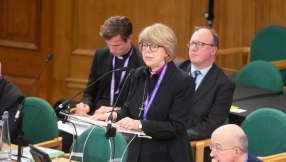
Dear Dr Peterson,
Forgive me for writing but I have just watched the one hour and 45 minutes of your discussion with Jonathan Pageau - twice - and I am an emotional wreck. It was a stunning and deeply moving interview in so many ways. My favourite interview – ever - in which I could feel, see and empathise with your pain. I also loved your friend Jonathan Pageau – his love for Christ, and for you, shone through. And there were several points in the interview when I punched the air and cried 'yes' or even 'amen', and at other points I was moved to tears!
I have 'followed' you ever since you stood up against compelled speech in Toronto and watched in amazement as your lectures on Genesis and other biblical subjects drew 10 million plus. Those of us who are preachers sometimes struggle to get 10!
I have also witnessed the phenomenal impact that you have had on those who would have considered themselves atheists or agnostics – in some ways you could be described as one of the best spokespeople that the church has had for years (although for obvious reasons I would not call you as an evangelist – not least because I'm not quite sure you either get, or believe the Evangel!). I think of one (now) friend, who was a hostile atheist but was deeply impacted by your work and now has a much deeper and more empathetic understanding.
But what struck me most was watching your obvious empathy, compassion and care for those you are talking to. That both impressed and concerned me. Why concerned? Because I thought that the pressure of carrying the sins, needs and problems of so many millions was more than any human being could bear – except the One! I remember praying that you would not break down and that you would come to know the One from whom all love, empathy and compassion is derived.
Anyway, back to the interview. To be honest I could write a letter that would take you as long to read as the interview! But let me stick with just a few points.
You state that you are amazed at your own belief and that you don't understand it, and that the idea of believing is too terrifying a reality to fully believe. I get both and a couple verses come to mind: "Lord, I believe, help my unbelief!" (Mark 9:24), and, "The fear of the Lord is the beginning of wisdom and knowledge of the Holy One is understanding" (Proverbs 9:10).
It was beautiful to see you moved to tears by thinking of and discussing Christ – would that those of us who say we follow Christ have had that same depth of emotion!
Your rebuke to the Church is spot on. "You believe that Jesus is the Son of God, yet you act that way?! And you expect me to believe?." The Bible itself points out that non-belief is precisely the result of the hypocrisy of those who claim to believe and yet don't live "a life worthy of the Lord". It's true that I have seen the opposite – those whose lives make you want to believe, but I know and acknowledge your point. And I love the way that later on you recognise the importance and goodness of the community of the Church. We were created to live in community – even as fallen sinners.
You say that you are in pain constantly – and you will forgive me for saying that you look like it. That was so moving especially when you admitted that whilst you have been able to help others, you can't help yourself. Physician heal thyself! Later on you talked about the loneliness and how it's tearing you to pieces. There is a song called Bittersweet Symphony by The Verve, which talks about how "I never pray, but tonight I'm on my knees; I need to hear some sounds that recognize the pain in me". That has been the experience of many of us. But what amazed me was how you express gratitude for what you have, "the ridiculous amount of blessings we enjoy" and even say grace before your meal in the evening.
Another astonishing insight was your statement that "the idea of joy seems cruel" and later on, you talk about how "the pain of existence will corrupt you without a saving meaning" and add "meaning gets contaminated with happiness". I think joy is the key. The joy of the Lord is your strength (Nehemiah 8:10). Human beings seek after happiness. They in effect seek the gifts and not the Giver – and as a result end up with nothing. Seeking joy, even joy through pain, is to seek the joy giver – Christ.
You have another critique of the Church which is spot on: "Is there anything more compelling than trying to aid things in their divine form? It should be an adventure that can be sold. I don't know why the Church can't do it.... something I've done."
I think there are several answers to your question. Firstly, there are a significant number of church leaders who can't share it – because they don't have it. They are, to use Christ's words, "wolves in sheep's clothing." Then I suspect that so many of us who do actually believe it, have lost the wonder and the joy. We look inward at ourselves, or outward at others, but never upward – or with the eyes of Christ.
Another criticism you had is an obvious one – that "one hour a week" Christians soon turn into "zero hours a week" Christians. Your "fear" and "terror" is far more preferable to me than the cheap grace espoused by so many followers of Christ.
You had a fascinating discussion with Jonathan about theosis – becoming God. I'm not sure I would go as far as Jonathan or the Eastern Orthodox (or indeed the Mormons). It was, as you know, the temptation that the devil offered Adam and Eve, "you shall become as God." I think the better perspective is Paul's, where he talks continually about being "in Christ". In other words, union with Christ, brings us union with God.
There is so much more that I would love to discuss – Mary, utopia and the danger of ideology, sex, love and the world seeming so unredeemed. But perhaps just one more thing before I finish.
You said: "The genuineness of your desire to help the poor is precisely proportional to the degree that you embody Christ...it can't be otherwise." Amen and Amen. Christ came to bless the poor. It's easy to talk about being for the poor – every champagne socialist is 'for' the poor. But to have the heart of Christ for the poor is another, deeper, much more effective, level.
I love at the end how you tell Jonathan that you are going to have to think about this a lot. "The question that keeps lurking in the back of my mind – does the fact that that's how it should be, mean that's the way it is?...that's a question of trust."
As Jonathan responded, yes, it is. Trust and faith do not mean that you don't think, or that you don't examine the evidence – but it does mean that you know enough to trust the Creator for all you do not know. James 1:5-6 comes to mind: "If any of you lacks wisdom, you should ask God, who gives generously to all without finding fault, and it will be given to you. But when you ask, you must believe and not doubt, because the one who doubts is like a wave of the sea, blown and tossed by the wind."
You say that you are "the most confused person I've ever met – and I've met some pretty confused people". You are not alone. Calvin rightly pointed out that the two hardest things to know in the world are yourself and God. But it is possible. Jonathan was right when he said that thousands of people are praying for you – myself and my wife did so this very evening as we said grace before our meal. I doubt you will ever read this but I know that God hears and answers prayer, so talking to you about Jesus would be lovely, but talking to Jesus about you is better.
Jonathan ended by saying "your story isn't over yet", to which you responded, "so much the pity for me." Longing to be rid of "this body of death" is not a bad thing. Longing to be free from pain is not a bad thing, and Romans 8 speaks beautifully of the tension you feel. It speaks of "the creation is subjected to frustration" longing to be set free "from its bondage to decay and brought into the freedom and glory of the children of God" (Romans 8:21). Yes, we do groan inwardly, but the Spirit helps us in our weakness. And as Paul writes memorably, "if God is for us, then who can be against us?"
Jordan, I long pray and plead that you would come to know the Christ of whom you spoke so movingly and compassionately. Like King Agrippa, you are "almost persuaded" (Acts 26:28), and so I hope that you will soon be fully persuaded. I'm not saying your pain would disappear (immediately), but your perspective would change so that like Paul, your "extreme pain and suffering" would seem light and momentary.
You are right: you cannot save yourself and you cannot save others, but you can be saved. And in so doing, you can be used to help others in a way that will dwarf even the great good you have already done.
May the Lord open your heart and reveal himself to you – that you may trust him,
Yours in Christ,
David













